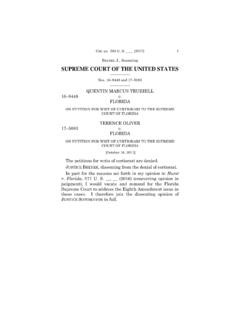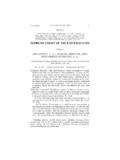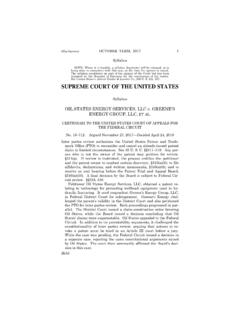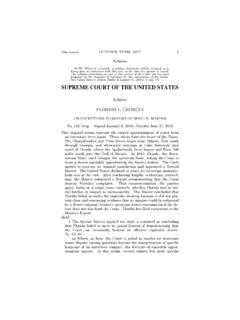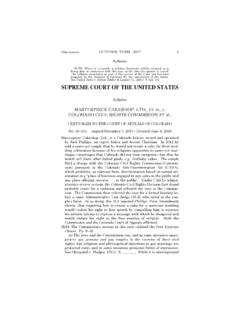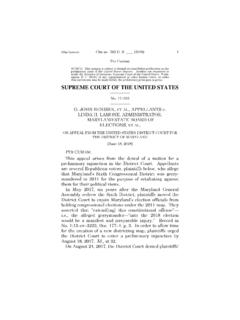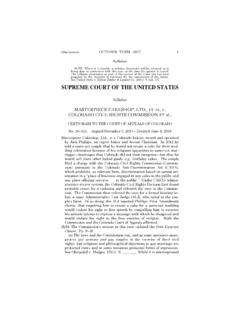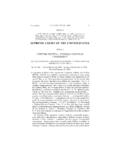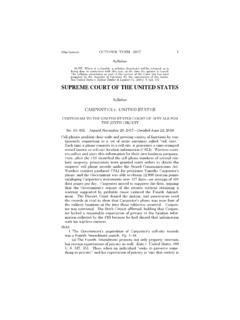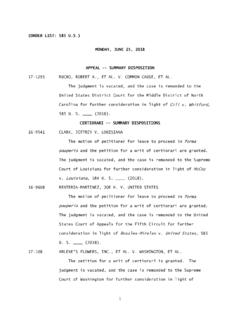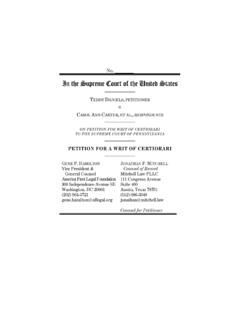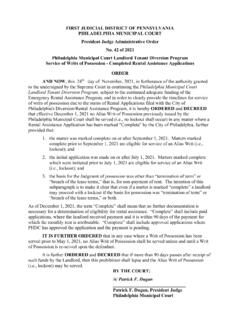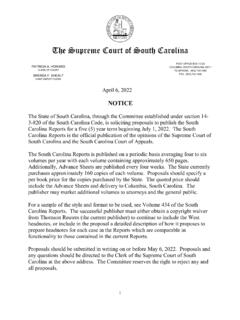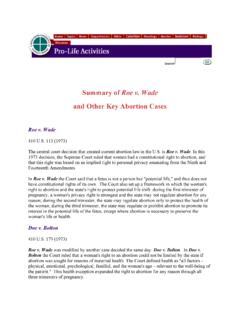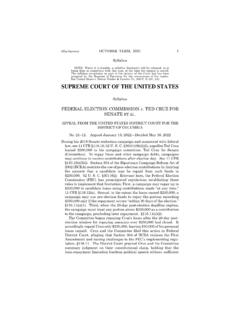Transcription of SUPREME COURT OF THE UNITED STATES
1 1 (Slip Opinion) OCTOBER TERM, 2020 Syllabus NOTE: Where it is feasible, a syllabus (headnote) will be released, as is being done in connection with this case, at the time the opinion is issued. The syllabus constitutes no part of the opinion of the COURT but has been prepared by the Reporter of Decisions for the convenience of the reader. See UNITED STATES v. Detroit Timber & Lumber Co., 200 U. S. 321, 337. SUPREME COURT OF THE UNITED STATES Syllabus JONES v. MISSISSIPPI CERTIORARI TO THE COURT OF APPEALS OF MISSISSIPPI No.
2 18 1259. Argued November 3, 2020 Decided April 22, 2021 A Mississippi jury convicted petitioner Brett Jones of murder for killing his grandfather. Jones was 15 years old when he committed the Mississippi law at the time, murder carried a mandatory sen-tence of life without parole. The trial judge duly imposed that sen-tence, which was affirmed on direct appeal. This COURT subsequently decided Miller v. Alabama, 567 U. S. 460, which held that the EighthAmendment permits a life-without-parole sentence for a defendant who committed a homicide when he or she was under 18, but only ifthe sentence is not mandatory and the sentencer therefore has discre-tion to impose a lesser punishment.
3 In the wake of that decision, the Mississippi SUPREME COURT ordered that Jones be resentenced in ac-cordance with Miller. At the resentencing, the sentencing judge acknowledged that he had discretion under Miller to impose a sentence less than life without parole. The judge determined, however, that lifewithout parole remained the appropriate sentence for Jones. Jones again appealed his sentence, citing both Miller and the then-recently decided case of Montgomery v. Louisiana, 577 U. S. 190, which held that Miller applied retroactively on collateral review. Jones contended that, under Miller and Montgomery, a sentencer must make a separate factual finding that a murderer under 18 is permanently incorrigiblebefore sentencing the offender to life without parole.
4 The Mississippi COURT of Appeals rejected Jones s argument. Held: In the case of a defendant who committed a homicide when he or she was under 18, Miller and Montgomery do not require the sentencer to make a separate factual finding of permanent incorrigibility before sentencing the defendant to life without parole. In such a case, a dis-cretionary sentencing system is both constitutionally necessary and constitutionally sufficient. Pp. 5 22. 2 JONES v. MISSISSIPPI Syllabus (1) A sentencer need not make a separate factual finding of perma-nent incorrigibility before sentencing a murderer under 18 to life with-out parole.
5 In Miller, the COURT mandated only that a sentencer followa certain process considering an offender s youth and attendant char-acteristics before imposing a life-without-parole sentence. 567 U. S., at 483. And in Montgomery, the COURT stated that a finding of fact regarding a child s incorrigibility .. is not required. 577 U. S., at 211. Miller and Montgomery require consideration of an offender s youth but not any particular factual finding. Miller and Montgomery therefore refute Jones s argument that a finding of permanent incorri-gibility is constitutionally necessary. Pp. 5 14. (2) Nor must a sentencer provide an on-the-record sentencing expla-nation with an implicit finding of permanent incorrigibility before sentencing a murderer under 18 to life without parole.
6 An on-the-rec-ord sentencing explanation is not necessary to ensure that a sentencer considers a defendant s youth. Nor is an on-the-record sentencing ex-planation required by or consistent with Miller or Montgomery, neither of which said anything about a sentencing explanation. Pp. 14 19. (3) The COURT s decision does not disturb Miller s holding (that a State may not impose a mandatory life-without-parole sentence on a murderer under 18) or Montgomery s holding (that Miller applies ret-roactively on collateral review). The resentencing in Jones s case com-plied with Miller and Montgomery because the sentencer had discre-tion to impose a sentence less than life without parole in light ofJones s youth.
7 The COURT s decision today should not be construed as agreement or disagreement with Jones s sentence. In addition, the COURT s decision does not preclude the STATES from imposing additionalsentencing limits in cases involving murderers under 18. Nor does the COURT s decision prohibit Jones from presenting his moral and policy arguments against his life-without-parole sentence to the state offi-cials who are authorized to act on those arguments. Pp. 19 22. 285 So. 3d 626, affirmed. KAVANAUGH, J., delivered the opinion of the COURT , in which ROBERTS, C. J., ALITO, GORSUCH, and BARRETT, JJ., joined.
8 THOMAS, J., filed an opinion concurring in the judgment. SOTOMAYOR, J., filed a dissenting opinion, in which BREYER and KAGAN, JJ., joined. _____ _____ 1 Cite as: 593 U. S. ____ (2021) Opinion of the COURT NOTICE: This opinion is subject to formal revision before publication in the preliminary print of the UNITED STATES Reports. Readers are requested to notify the Reporter of Decisions, SUPREME COURT of the UNITED STATES , Wash-ington, D. C. 20543, of any typographical or other formal errors, in order that corrections may be made before the preliminary print goes to press.
9 SUPREME COURT OF THE UNITED STATES No. 18 1259 BRETT JONES, PETITIONER v. MISSISSIPPI ON WRIT OF CERTIORARI TO THE COURT OF APPEALS OF MISSISSIPPI [April 22, 2021] JUSTICE KAVANAUGH delivered the opinion of the COURT . Under Miller v. Alabama, 567 U. S. 460 (2012), an indi-vidual who commits a homicide when he or she is under 18 may be sentenced to life without parole, but only if the sen-tence is not mandatory and the sentencer therefore has dis-cretion to impose a lesser punishment. In this case, a Mis-sissippi trial judge acknowledged his sentencing discretionunder Miller and then sentenced petitioner Brett Jones tolife without parole for a murder that Jones committed whenhe was under 18.
10 The Mississippi COURT of Appeals af-firmed, concluding that the discretionary sentencing proce-dure satisfied Miller. Jones argues, however, that a sentencer s discretion toimpose a sentence less than life without parole does not alone satisfy Miller. Jones contends that a sentencer who imposes a life-without-parole sentence must also make a separate factual finding that the defendant is permanentlyincorrigible, or at least provide an on-the-record sentencing explanation with an implicit finding that the defendant is permanently incorrigible. And Jones says that the trialjudge did not make such a finding in his s argument that the sentencer must make a finding 2 JONES v.
